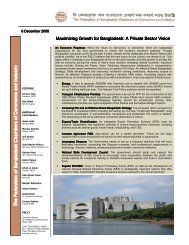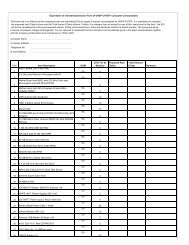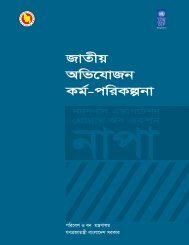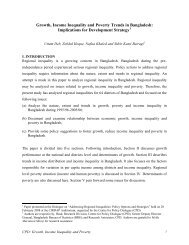Framework for a Strategy of UP Revenue/Resource Mobilisation ...
Framework for a Strategy of UP Revenue/Resource Mobilisation ...
Framework for a Strategy of UP Revenue/Resource Mobilisation ...
You also want an ePaper? Increase the reach of your titles
YUMPU automatically turns print PDFs into web optimized ePapers that Google loves.
may have been given. This assessment register should be a public document which anyone can<br />
consult.<br />
d) There should be a register <strong>for</strong> payments, listing <strong>for</strong> each plot and plot owner, the final<br />
assessment (i.e. the amount due <strong>for</strong> the current year), plus any arrears from previous years, the<br />
amount paid in the current year (with date <strong>of</strong> payment and receipt number), and the amount still<br />
outstanding (see Annex-3 <strong>for</strong> a sample pro-<strong>for</strong>ma). Such a register enables the <strong>UP</strong> to identify<br />
immediately who has not paid, and the amount owed, thereby enabling effective follow-up <strong>of</strong><br />
on-payers.<br />
e) Tax collection <strong>for</strong> the current year should start on 1 st July and be completed by 30 th June.<br />
Collections should not spill over into the following fiscal year. Any amount outstanding at 30 th<br />
June should be recorded as an arrear to be collected the following year (with or without<br />
penalty). This helps to clarify what should be paid and when, and helps with accounting <strong>for</strong> the<br />
year’s revenue.<br />
f) The present system <strong>of</strong> issuing receipts and recording money received in a register, with details<br />
<strong>of</strong> the receipt number and date, appears to work reasonably well, enabling cash received to be<br />
checked against receipts (so long as those checks are actually made). However, in addition to<br />
(or instead <strong>of</strong>) the chronological register <strong>of</strong> cash received, revenue receipts should be recorded<br />
in the register specified in (d) against the plot number, so that non-payers can immediately be<br />
identified.<br />
g) Money collected should be paid into the bank promptly after checking cash against receipts<br />
issues. Ideally, this should be on a daily basis. Ideally, also, larger payments should be made<br />
directly to the bank, reducing the risk <strong>of</strong> loss or fraud. This would require a bill to be issued,<br />
which can be taken to the bank. This is now done in some cities and municipalities (e.g. Tongi),<br />
but <strong>for</strong> <strong>UP</strong>s it would only be realistic <strong>for</strong> the largest payments (say Tk.1, 000 and above).<br />
h) Collectors should continue to be employed on the basis <strong>of</strong> commission. It is commonly claimed<br />
that 15% commission is not sufficient incentive. However, with the higher assessments, and<br />
other steps to improve collection per<strong>for</strong>mance, the amount collected should increase<br />
significantly, augmenting the incentive effect. Guidance issued by LGD allows a further 5% to<br />
be allocated to village police, and to reward the best per<strong>for</strong>ming collectors, but it is not clear<br />
whether this is being applied at all, and if it is, whether it has any effect. <strong>UP</strong>s may spend 3% to<br />
remunerate the village police in the ward concerned, 0.5% <strong>for</strong> the head <strong>of</strong> the village police<br />
group and a further 1.5% <strong>for</strong> incentives <strong>for</strong> the best collection per<strong>for</strong>mance among the villages<br />
An alternative would be <strong>for</strong> the <strong>UP</strong> to directly employ collectors and pay them out <strong>of</strong> the<br />
revenue collected. However, that is almost certain to increase collection costs, as they would<br />
15










